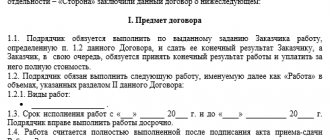When and who cooks
A claim is a written disagreement of one party to a civil law relationship with the behavior of the other. The reason for sending such a request is any violation by the counterparty of contractual terms, for example:
- delivery of low-quality goods, poor-quality services or performance of work;
- failure to fulfill obligations in general;
- incomplete payment;
- failure to provide documents provided for in the contract;
- other reasons.
This appeal has two purposes:
- make an attempt to resolve disagreements - ideally, after receiving the letter, the second party either fulfills the requirements set out in it, or enters into a constructive dialogue, which ultimately ends in reaching a consensus;
- prepare the ground for subsequent recourse to court - the civil and arbitration process requires compliance with the pre-trial procedure for resolving the dispute in a number of cases. For example, sending an official letter before going to court is necessary for disputes related to the termination of a lease agreement or arising from cargo transportation contracts. If federal law establishes a mandatory pre-trial procedure for resolving disputes, and the parties ignored it and immediately went to court, the claim will be returned to the applicant.
In a number of cases, the requirement for pre-trial procedure is not presented, including:
- bankruptcy cases;
- cases considered in writ proceedings;
- corporate disputes.
Thus, the reason for writing a letter is any violation of the agreement by the other party to the relationship. A party who is dissatisfied with the actions of the counterparty prepares an appeal.
To make your claim more convincing and help solve the problem, study court decisions in similar cases. The database of judicial practice in ConsultantPlus will help you find them (get free access to it by clicking on the link below). The database contains decisions of all Russian courts, and the search is as simple as in Yandex. Be sure to refer in the text of the appeal to those cases that the court decided “in your” favor.
to read.
What is a claim to a contractor for violation of deadlines for completing work under 44-FZ?
A complaint is an official letter drawn up on company letterhead. It contains the requirements of one of the parties to the contract to the counterparty in the event of violations of the contract. Claims work represents the initial stage of resolving a conflict situation and is used as a pre-trial measure.
You can see a sample complaint to a contractor about violation of deadlines for completing work under 44-FZ below:
The document is sent to the guilty party in the following cases:
- identifying discrepancies between the quality characteristics of the goods (services) provided and those specified in the contract;
- violation of terms of payment or delivery of products;
- unilateral termination of the contract, provided that the counterparty has committed serious violations of its obligations;
- failure to comply with other terms of the contract.
The parties have the right to insist on the elimination of violations, payment of fines and penalties in accordance with the terms of the agreement. Based on the provisions of the Code of the Russian Federation on Administrative Offences, drawing up a claim when a controversial situation arises is a mandatory measure. This is due to the fact that courts do not consider claims without evidence of claims work.
The algorithm for executing claims work is not defined by the provisions of 44-FZ. Article 95 regulates only cases of drawing up such a document regarding unilateral termination of a contract. In other situations, it is advisable to be guided by the provisions of the Civil Code of the Russian Federation, which contain measures of liability of the parties for failure to fulfill contractual obligations.
Article 4 of the Arbitration Procedural Code of the Russian Federation provides for situations in which the conduct of claims work is a mandatory condition. There is a reference to the fact that the statement of claim will not be accepted by the court if there is no evidence of sending the claim to the counterparty.
The document can be drawn up on the basis of individual regional (municipal) regulations. In addition, there are highly specialized federal legislative acts, according to which a dispute can be resolved when supplying certain types of goods (motor transport, communication services, etc.)
Examples
For example, here is a sample claim of an organization against an organization for failure to fulfill a contract:
Sample addendum to a claim with calculation of the amount of claims:
Another example you can use is a sample letter of complaint from a buyer to a seller of goods of inadequate quality:
Sample of how to write a claim for debt repayment:
Example of a copyright infringement claim:
Features of drawing up a claim to a contractor for violation of deadlines for completing work under 44-FZ
It is necessary to carefully read the text of the contract. As a rule, the procedure and deadlines for filing a complaint and responding to it are specified in it. The amount of the penalty for violation of the terms of the contract may be reduced or increased relative to the amount specified in the legislative act.
If a claim is not filed on time, the guilty party may continue to show signs of bad faith, citing the absence of a complaint against them. In this case, such a fact is regarded as non-compliance with the pre-trial method of dispute resolution. The consequence is the court’s refusal to consider the claim.
The document can be sent to the guilty party the next day after it violates the terms of the contract.
It is drawn up on official letterhead; the content must reflect the following information:
- List of requirements and their justification. It is mandatory to indicate the details of the contract and references to those clauses that were violated.
- The period set for correcting defects.
- In the event that a party’s failure to fulfill its obligations entails the imposition of a fine or penalty on it, it is necessary to provide a calculation of the amount claimed for payment.
- Details of both parties.
The claim must be accompanied by documentation that substantiates the validity of the claims. It can be drawn up in any form, but it must bear the company’s seal and the manager’s signature.
Requirements that a claim may contain in case of violation of deadlines for fulfilling obligations:
- Finish the work as quickly as possible (or by the newly established deadline). The same paragraph stipulates the possibility of collecting a penalty (based on law or contract).
- Compensate the plaintiff for losses incurred due to the need to involve third parties in the work.
- Reduce the cost of services under the contract.
- Terminate the agreement.
The claim to the contractor for violation of deadlines for completing work under 44-FZ (sample) and for poor-quality services provided are slightly different. In a situation where violations are associated with the contractor’s dishonest performance of work, it is advisable to reflect in the document a list of discrepancies regarding the points contained in the technical specifications. Next there should be a requirement to correct the defects at the expense of the contractor. It is necessary to allocate a certain (real) period for this. Its duration is determined based on the nature of the corrections and types of work.
Who makes the claim
In large organizations, there are entire specialized departments to resolve various types of legal issues, including the restoration of broken contractual obligations, and the preparation of claims is the responsibility of qualified lawyers.
In small companies, complaints are written by employees or heads of structural divisions that are in charge of a particular contract. The main condition is that the specialist drafting the document has legal literacy and has an understanding of the legislation of the Russian Federation regarding contractual relations.
What is a contract
A contract is a document under which the customer instructs the contractor to carry out any work or provide services in a certain volume and within a specified period of time.
In this case, the customer’s function is to purchase the materials, tools and equipment necessary for the work, provide a place for their implementation, formulate tasks, control and accept the work, and the contractor’s function is to fulfill his obligations without violating the deadlines and pre-approved budget .
In order for all the terms of the contract to be observed, it is important to write them down in detail and scrupulously, without losing sight of any nuances, but even this in some cases does not guarantee its 100% fulfillment.
The role of the claim
According to the law, a work contract, like any other similar document, implies the fulfillment by one of the parties of their obligations to carry out any work, and the second - their payment in a pre-agreed amount and order.
If any of the parties violates at least one clause of this agreement, its counterparty can file a claim - this is its right enshrined in the legislation of the Russian Federation.
The formation of this document is the first step towards resolving controversial and conflict situations
Based on the above, we can say that the role of the claim is quite large. It allows not only to identify the problems that arose during the execution of the contract, but also to promptly prevent the development of the situation and bringing the case to court.
How to write a letter of claim
When filing a claim under Law No. 44-FZ, you must include the following information:
- data of both parties to the contract, including the name of the company, its address;
- number and exact date of conclusion of the contract;
- the reasons for which the claim is being made;
- evidence of improper fulfillment of contractual obligations;
- the grounds on which liability is imposed on the supplier;
- requirements put forward by the customer;
- the date by which the described requirements must be fulfilled on a voluntary basis.
It is necessary to pay attention to the issue of preparing requirements. You should be as specific as possible about what exactly the customer wants. In this case, the requirements should be based only on the violations committed. The customer is required to indicate the measure of liability that can be applied to the supplier. It is worth identifying the law on which the party filing the claim relies.
If money is involved, a calculation must be attached to prove the validity of the claims made.
The document must be signed by a person authorized to perform such an action on behalf of the customer. In this case, this right can be given on the basis of a power of attorney, the charter of a municipal organization, etc.
Not to terminate, but to change
At the request of the interested party, the contract may not be terminated, but amended by the court, if the following conditions are simultaneously met:
- at the time of concluding the contract, the parties assumed that such a change in circumstances would not occur;
- the change in circumstances was caused by reasons that the interested party could not overcome after their occurrence with the degree of care and prudence that was required of it by the nature of the contract and the conditions of turnover;
- execution of the contract without changing its terms would so violate the relationship of property interests of the parties corresponding to the contract and would entail such damage for the interested party that it would largely lose what it had the right to count on when concluding the contract;
- It does not follow from business customs or the essence of the contract that the risk of changes in circumstances is borne by the interested party (Article 451 of the Civil Code of the Russian Federation).
In other words, amendment of the contract due to a significant change in circumstances is permitted by court decision in exceptional cases. In such cases, when termination of the contract is contrary to public interests or will entail damage for the parties that significantly exceeds the costs necessary to execute the contract on the terms changed by the court.
Ekaterina Egorova,
for the magazine "Practical Accounting"
Have a question?
“Practical Accounting” is an accounting journal that will simplify your work and help you keep your books without errors. Get a guaranteed expert answer to your questions, as well as full access to all materials >>







